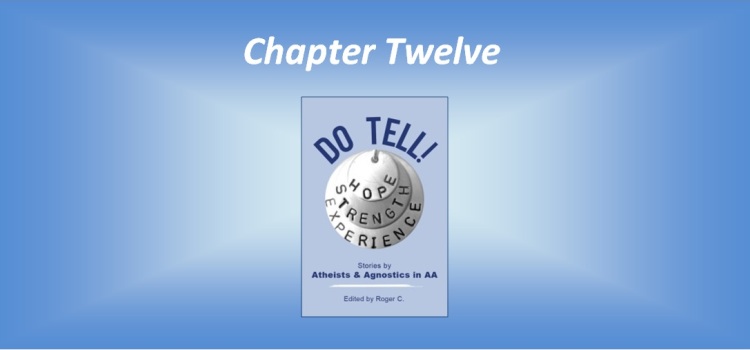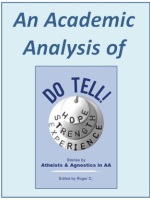God Problems

Chapter 12:
Do Tell! Stories by Atheists and Agnostics in AA
Betsy M.
My father got sober in AA in 1952. He drove two hours round trip to the nearest city to attend the only weekly meeting in his region. I was five, but I have no memories of my father as a drinker. He didn’t try to frighten us kids away from alcohol, but he did tell us that AA was the place to go if we ever “got into trouble” with booze. As far as I knew, my father had never lied to me, so in 1984 I took his advice. I was 37, and I had been unsuccessfully trying to control my drinking. At my first meeting, I felt hopeful. I realized that I could get sober in AA. Though I saw no one at that meeting who seemed “like me”, I identified with at least one thing each person said. After the meeting, a scary looking guy came up to me and said: “Just don’t drink, even if your ass falls off”. That I understood his warning as sage advice certainly speaks to how ready I was for AA.
In the small town where I got sober, I ran into God problems almost immediately. My first roadblock was The Big Book. I couldn’t stand it. It struck me as a self-help book for Christian men from my father’s generation. I am a woman, a feminist and an atheist who came of age in the 1960s, not the 1940s. The Book was not written with me in mind, and no matter how hard I tried to twist the language to make it fit, it didn’t.
The second roadblock was The Lord’s Prayer. One of my regular meetings closed with that prayer. At first, I didn’t recite the prayer, not because the words offended me, but because I don’t believe them. A few well-meaning people urged me to “fake it ‘til you make it”. I didn’t want to bring negative attention to myself, so I decided to conform. I felt in my gut that if I was going to keep coming to AA, which I absolutely had to do, I needed to avoid alienating myself from the people whose help I needed.
After my first anniversary, I got a sponsor. Like all the AA women I knew, her higher power was God. In fact, she had just converted to Catholicism. She was, fortunately, willing to allow me to work the Steps without trying to force me to define a higher power for myself. She told me not to worry, that she understood that “some of us take longer than others”. By the time I got to my 5th Step, I was trying to be opened-minded. I thought maybe I should give the higher power thing a try. I had met a lot of people who seemed happily sober. And while I was grateful to be sober, I was certainly not happy during those first couple of years.

A doctoral dissertation – “Experiences of Atheists and Agnostics in AA” – is based on the book Do Tell. For more information click on the above image.
I began my exploration with a book of daily readings, consisting of an AA-related reflection, followed by a prayer. Although I tried to approach this sincerely, saying the prayer made me feel like a phony, so I gave it up. I also met with a professor of theology, a friend of a friend. She gave me interesting things to read, from many monotheist traditions, and we met once a month to discuss them. I found many of the writers intelligent and persuasive. Still, I was not persuaded. By my third year, I decided I had given God an honest try, and I returned to my former belief (or nonbelief). I didn’t share my decision with anyone because I didn’t know anyone I thought would accept it. I remember I felt lonely about that. I had a family and a demanding job. Otherwise, I might have looked outside my town for some meetings with like-minded women.
By the time I’d been sober six years, I was going to only one meeting a week. I appreciated my sober life. I liked the person I had become, and I never had a desire to drink. I also hadn’t changed my ways in AA. I was friendly with only a handful of people. I didn’t go to retreats, or listen to tapes, or join in AA social events. After I completed the steps, I drifted away from my sponsor, and didn’t look for another. Though I was respected in meetings as someone with solid sobriety and a good message, I was rarely asked to sponsor, perhaps because I wasn’t an insider. Also, I didn’t usually reach out to newcomers because I didn’t feel I could be honest about my atheism. It’s hard to guide someone through the Steps and avoid the God talk and I believed newcomers were better off if they could fit in. In 1994, when I was ten years sober, I had a new relationship and began skipping my Sunday morning meeting. In a few months, I drifted away.
In 2004, after a decade away from AA, I returned. I had experienced a number of losses, and I thought meetings might chase away my despair. It worked. I soon felt better – more hopeful, more energetic. I was, however, disappointed to see that AA was still conservative. At that time, many newcomers were calling themselves “cross-addicted”, and they were meeting resistance. Some of the members, mostly “old-timers”, claimed that AA is for alcoholics only. Though the label “cross-addicted” was never banned, those who used it knew they were being tolerated more than accepted. I was twenty years sober, and I still didn’t know another AA atheist.
In 2005, I moved to another small town in a nearby state. The town was politically progressive, so I assumed that would spill over into AA. Not so. If anything I found meetings to be even more structured with less opportunity for free discussion. Fortunately, I finally did meet a couple of fellow travelers, Thom and Dominick. We began to talk about the need for a meeting for agnostics and atheists. Thom researched agnostic AA meetings online and printed out some materials, including an alternative form of the Twelve Steps. We were good to go. We named our group “We Are Not Saints”. We spread the word, at first, by announcing it at other meetings. Though we heard some grumbling and rumors of opposition, we had no trouble getting the meeting listed. Our group has been meeting for several years with a steady attendance of 10-15, many of whom are newcomers.
After 30 years, I can unequivocally say that I owe my sober self to AA. I doubt I would have made it through my first sober decade without going to meetings. I am cheering the current movement of freethinkers for challenging conservative AA. In 2014, my buddies, Thom and Dominick, attended the first AA convention for agnostics, atheists and freethinkers in Santa Monica. They returned beyond enthusiastic about the potential for this new movement.
If it succeeds, and AA begins to welcome and accept agnostics, atheists and freethinkers, countless suffering alcoholics who see AA as a religious organization will begin to lead sober lives, finally comfortable in the rooms of AA.
![Do Tell! [Front Cover]](https://aaagnostica.org/wp-content/uploads/2015/05/Do-Tell-Full-Blue-Front-Cover-200-FRAMED.jpg) This is a chapter from the book: Do Tell! Stories by Atheists and Agnostics in AA.
This is a chapter from the book: Do Tell! Stories by Atheists and Agnostics in AA.
The paperback version of Do Tell! is available at Amazon. It is also available via Amazon in Canada and the United Kingdom.
It can be purchased online in all eBook formats, including Kindle, Kobo and Nook and as an iBook for Macs and iPads.

























I particularly relate to feeling that the big book wasn’t written for people like me. With regard to literature, Living Sober is better even though it didn’t come out until I had been sober for many years.
Thank you, and I relate to every word. I’ve been sober 27 years and AA helped me through those early days when I was “faking it until I made it”, and I still enjoy the fellowship. Now, as a Buddhist, I keep my mouth closed during The Lord’s Prayer, and defer reading aloud any passages from the Big Book that mention God, as I will not speak aloud something I do not believe in. The GSR from my home group says Central AA office is wanting to rewrite the Big Book in simpler language, for people with reading challenges or those who speak English as their second language. While that seems a good idea, I’m pretty convinced that AA will NEVER take “God”, “He” and “Him” out of the Big Book. And I would much prefer “greater consciousness” to “higher power”. But it’s not gonna happen. Thanks for sharing your experience.
I enjoyed reading your writing style, Betsy M.
Betsy M. writes>>> I am cheering the current movement of freethinkers for challenging conservative AA. In 2014, my buddies, Thom and Dominick, attended the first AA convention for agnostics, atheists and freethinkers in Santa Monica. They returned beyond enthusiastic about the potential for this new movement. <<<
As a known atheist since my first AA meeting 56 years ago in Boston, Mass., I haven’t been challenged by faith-based AA fellowship members, as I hadn’t challenged. I attend inclusive meetings, i.e. with those of faith and so-called freethinkers.
Malibu, Santa Monica and Venice Beach, I was a meeting secretary for some of the oldest meetings in the USA. I mostly attended Southern California beach meetings.
My openness being an atheist helped engender my sobriety, as well as practicing the teachings of Jesus Christ. To be myself, is to become myself.
“Deus tem de existir.
Tem beleza demais no universo,
e beleza não pode ser perdida.
E Deus, é esse Vazio sem fim,
gamela infinita,
que pelo universo vai colhendo
e ajuntando toda a beleza que há,
garantindo que nada se perderá,
dizendo que tudo o que se amou
e se perdeu haverá de voltar,
se repetirá de novo.
Deus existe para tranqüilizar a alma _______________________________________I don’t know why so much teasing with GOD, the World service is full of lies and scams to go after, have heard of the auction of the big book and royalties from Bill
Betsy M,, thank you for mentioning your challenges with sponsoring others. Helping new women has always been an important part’ of my sobriety but I’m reluctant now because I just can’t espouse something I don’t believe myself. A couple of times I’ve advised those who asked me to be their sponsor that I’d be happy to but recommended that they also find a spiritual sponsor. The last woman drifted away to I hope, someone who could do what I myself cannot.
Hi All
My name is Jabu K. and I am an alcoholic. Thank you Betsy M. for your message. I relate fully with what you have gone through. AA is very conservative and backwards in South Africa. Those who believe in God are still holding to old ideas and this chases alcoholics away. I have been challenged many times in AA meetings because of being an atheist. I am now 31 years sober in AA and I am grateful to AA for keeping me sober. Fortunately for me, I don’t mind people who believe in a Higher Power, though sometimes it can be too much! Right from the beginning I made it clear that I don’t believe in any Higher Power. Regards